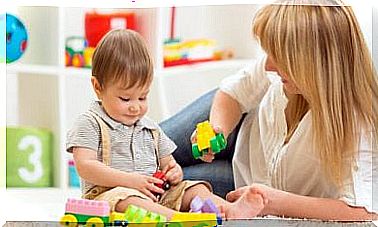4 Strategies To Increase Self-esteem In Your Children

In order to make our dreams come true, personal well-being is absolutely necessary. While this is innate for many people, it is more difficult for others, especially in childhood. So in these cases, we need to make sure that we teach our children to love themselves more and to have good self-esteem.
The expression ‘love yourself more’ may sound a bit broad. It may even seem to be something that needs no further explanation, because in theory every child should love themselves. However, there is no harm in helping children nurture their self-esteem in a healthy way.
Personal appreciation and insight into your abilities generate a feeling called self-esteem. This is a key factor for the healthy and happy development of a child. In this article we will therefore explain its importance and the methods necessary to improve it.
Problems of children with low self-esteem
There are certain patterns of behavior that can indicate that something is wrong with a child’s self-esteem. All of these can be avoided or dealt with in a better way, no matter the case.
- He is often sad for no apparent reason.
- Your child refuses to do activities alone or on their own.
- He has no interest in spending time with friends.
- Your child is not open to the other family members and does not speak out.
- He can not identify with people he does not know.

4 Strategies to Teach Your Kids How to Have Self-Esteem
As a mother, it is important to be aware of what you should and should not teach your children so that they have better self-esteem. Keep the following strategies in mind and make sure you apply them in everyday life.
1. Spend time with them
In this first point, we are going to focus on a fundamental rule of parenting. Parents should spend quality time with their children. This makes them feel valuable, they are heard and understood. They will realize that they are important to their parents.
It is essential that you stop what you are doing when your children really need you. This is the best way to show them that their problems matter to you and that you are willing to help them find a solution.
In addition, you can take advantage of this bond to create values, teach them, and recognize and accept their strengths and weaknesses.
2. Treat their successes and failures well
Childhood is a life stage of constant learning. Therefore, it makes sense that our children make mistakes. It’s about how you deal with this. Instead of questioning their actions or even their abilities, show them that they can always get something positive out of any adversity.
In addition to teaching the importance of resilience, you also need to act right when they achieve their goals. You should recognize their achievements and congratulate them on their success and dedication. It’s also important that you don’t compare them to what their siblings or friends have done.
In this way, your children will notice that you are interested in their development. They will see that you are there to guide and help them when they need it.
But beware: the latter never means that you should at all costs prevent them from making mistakes, or offer them the solutions. It’s more about the opposite.
3. Teach them to interpret their emotions
The so-called emotional intelligence is an important aspect to enable children to develop during their childhood. Therefore, you must teach children to interpret their feelings and act accordingly.
It is vital that you listen to them and help them understand that what they are feeling is normal. They should not feel bad if they are afraid, anxious, or worried or sad about something. These are completely normal emotions that we all experience.

4. Be an example and improve them in a constructive way
Your kids learn everything from you, even if you don’t teach them anything special. Therefore, your actions should reflect the idea of positive risk-taking, of facing responsibilities and, above all, of respecting, loving and understanding others.
On the other hand, if you notice flaws or unacceptable behavior in them, don’t attack their self-esteem. To teach your kids to love themselves more, you have to deal with their actions and not their abilities.
So instead of saying, “You’re bad at math and you’ll never learn it,” you should say, “Look, you’re doing this the wrong way, concentrate and practice and you’ll get it.” It may seem unimportant to you, but it really makes the difference between a confident child and a child with low self-esteem.
Finally, don’t forget the “little” actions that are also vital. So you should try to set healthy boundaries and always be affectionate. In this way, you teach your children to have more self-esteem. It will be a great tool for their life!









